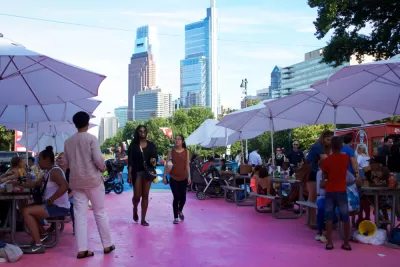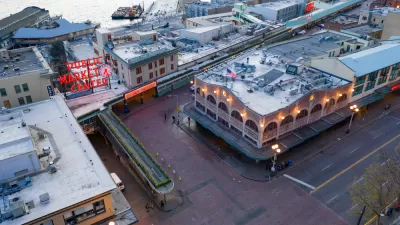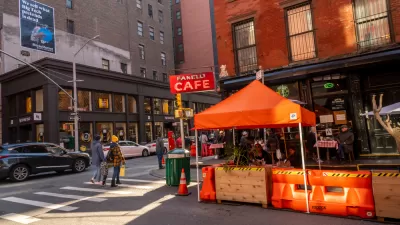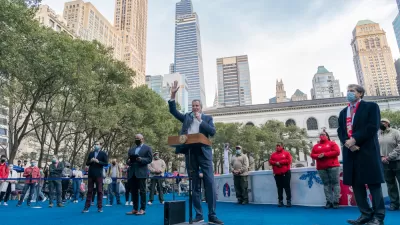Emergency outdoor dining regulations approved in June and set to expired in December could now be extended through the coming year.

In June, Philadelphia adopted outdoor seating regulations "to make it easier for restaurants and bars with kitchens to serve outdoors," offering a lifeline to restaurant businesses in the city, according to an article by Darryl C. Murphy. Those rules are set to expire in December, when the public health concerns of the COVID-19 pandemic are still expected to linger, perhaps even in a large, second wave.
As Murphy reports, Philadelphia's outdoor dining innovation revolution now has a chance to be continued all the way through 2021:
With this in mind, City Councilmember Allan Domb introduced on Thursday two bills that would extend regulations for expanded outdoor dining another 12 months, through the end of 2021. One bill would authorize sidewalk cafes to continue operating under the coronavirus emergency rules while another would extend the regulation allowing the city’s Streets Department to close the public right-of-way to cars so diners could enjoy expanded al fresco options.
The article includes anecdotes from the experiences of restaurant owners who have converted to outdoor dining in recent months, as well as data about how many restaurants in the city are placing tables in locations previously reserved for cars (as also reported previously by Billy Penn), and the ongoing decline in sales at restaurants driving the need for innovation.
The news about Philadelphia's intentions to extend its COVID-19 outdoor dining rules came the same week as an announcement by New York City Mayor Bill de Blasio that outdoor dining rules would be made permanent in the Big Apple.
FULL STORY: Philly City Council wants to keep expanded outdoor dining options through 2021

Study: Maui’s Plan to Convert Vacation Rentals to Long-Term Housing Could Cause Nearly $1 Billion Economic Loss
The plan would reduce visitor accommodation by 25,% resulting in 1,900 jobs lost.

North Texas Transit Leaders Tout Benefits of TOD for Growing Region
At a summit focused on transit-oriented development, policymakers discussed how North Texas’ expanded light rail system can serve as a tool for economic growth.

Using Old Oil and Gas Wells for Green Energy Storage
Penn State researchers have found that repurposing abandoned oil and gas wells for geothermal-assisted compressed-air energy storage can boost efficiency, reduce environmental risks, and support clean energy and job transitions.

From Blight to Benefit: Early Results From California’s Equitable Cleanup Program
The Equitable Community Revitalization Grant (ECRG) program is reshaping brownfield redevelopment by prioritizing projects in low-income and environmental justice communities, emphasizing equity, transparency, and community benefits.

Planting Relief: Tackling Las Vegas Heat One Tree at a Time
Nevada Plants, a Las Vegas-based nonprofit, is combating the city’s extreme urban heat by giving away trees to residents in underserved neighborhoods, promoting shade, sustainability, and community health.

How Madison’s Tree Planting Efforts Are Growing a Healthier Community
Madison’s annual tree planting initiative is enhancing environmental resilience, public health, and community livability by adding 1,400 carefully selected trees citywide, with strong community and institutional support for urban forestry.
Urban Design for Planners 1: Software Tools
This six-course series explores essential urban design concepts using open source software and equips planners with the tools they need to participate fully in the urban design process.
Planning for Universal Design
Learn the tools for implementing Universal Design in planning regulations.
Ascent Environmental
Borough of Carlisle
Institute for Housing and Urban Development Studies (IHS)
City of Grandview
Harvard GSD Executive Education
Toledo-Lucas County Plan Commissions
Salt Lake City
NYU Wagner Graduate School of Public Service





























